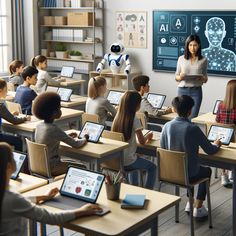What Microsoft’s AI Push Means for Your Windows Laptop

Microsoft has long been at the forefront of technology innovation, and its recent push into the realm of artificial intelligence (AI) is poised to redefine the user experience on Windows laptops. The integration of AI into Windows is a strategic move that aims to make computers more intuitive, helpful, and efficient.
One of the most immediate impacts of Microsoft’s AI push is the enhancement of user personalization. AI algorithms are now capable of learning from user behavior patterns to tailor the laptop experience. This means that your Windows laptop will increasingly be able to predict your needs, suggest relevant content, or automate routine tasks without explicit instructions.
Cortana, Microsoft’s digital assistant, stands to gain considerably from these advancements in AI. With more sophisticated algorithms, Cortana could evolve from being a simple voice-activated tool for setting reminders and conducting web searches to a proactive personal assistant that manages your schedule, emails, and even helps you multitask during your workday.
Another significant area where AI can make an impact is in security. Microsoft has been working on AI-driven security features that can detect and neutralize threats before they compromise the system. This modern approach to cybersecurity not only improves upon the traditional antivirus software but also offers real-time protection against emerging threats.
AI-driven optimization for performance is an additional benefit that cannot be overlooked. Windows laptops might soon come with AI capabilities that manage power consumption more effectively, ensuring longer battery life and optimal system performance. This smart energy management would be especially beneficial for those who rely heavily on their laptops while on-the-go.
Moreover, accessibility features are also expected to improve with AI integration. For example, visual and auditory assistance technologies powered by AI could offer unprecedented levels of support for users with disabilities, making computing more inclusive.
Lastly, productivity tools like Office 365 are likely to become even smarter and more collaborative. With AI working behind the scenes, apps like Word, Excel, and PowerPoint could provide real-time suggestions to enhance your documents or help you analyze data trends more efficiently.
In conclusion, Microsoft’s dedication to integrating AI into Windows laptops promises to create a more personalized, secure, intelligent, and accessible computing experience for all users. This technology shift isn’t just about staying ahead of competitors; it’s about empowering people with tools that anticipate their needs and adapt accordingly – transforming how we interact with our devices at a fundamental level.


